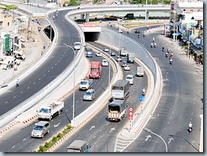Saturday, July 13, 2013
Vietnam Turns to Nature for Power
The first phase of the Cong Hai wind power project, which houses a total of three turbines with a capacity of 1 MW each, will begin this year in the Cong Hai Commune of Vietnam’s Thuan Bac district. The project is expected to generate about 14 million kWh of electricity annually.
The second phase of the project will likely be finished by 2015, and will house 15 turbines on 160 hectares. Each turbine is expected to have a capacity of 2.5 MW, with each MW of the project costing an estimated US$3.2 million in investment.
The Ninh Thuan region is especially attractive for developers due to it having a number of areas with strong wind sources, which includes areas in the Ninh Phuoc, Thuan Nam, Thuan Bac and Ninh Hai districts. As such, other wind farm projects have been approved in principle by the local governments to be established in these districts aiming for a total wind exploitation capacity of 2,000 MW by 2020.
In addition, the Binh Thuan province has also been noted to be a good region for wind power generation. The provincial authorities have already allowed investors to commence development on 12 wind power projects in the region, and two of them are already in operation for a total designed capacity of 30 MW.
“[Vietnam’s] wind power potential to be exploited in the next few years is 6,500 MW,” noted Nguyen Anh Tuan, deputy director of the Vietnam Institute of Energy. “However, only three wind farm projects have connected with the national power network with a combined capacity of around 120 MW [so far], with another 40 still under consideration for investment approval.”
Wind power is not the only alternate source of power the country is looking utilize – there are six additional hydropower generators with a total capacity of 213.5 MW looking to commence operations this month. These include the second generator of the Khe Bo hydropower plant (with a capacity of 30 MW) and the first generators of the Song Bac, Ta Thang, Van Chan, Dam Bri and Dong Nai 2 plants, with respective capacities of 42 MW, 30 MW, 19 MW, 37.5 MW and 35 MW.
The country’s total power consumption last month was estimated at nearly 11.9 billion kWh, up 11.6 percent year-on-year.
Dezan Shira & Associates is a specialist foreign direct investment practice, providing corporate establishment, business advisory, tax advisory and compliance, accounting, payroll, due diligence and financial review services to multinationals investing in emerging Asia. Since its establishment in 1992, the firm has grown into one of Asia’s most versatile full-service consultancies with operational offices across China, Hong Kong, India, Singapore and Vietnam as well as liaison offices in Italy and the United States.
Saturday, June 1, 2013
US firms eye opportunities in Vietnam’s infrastructure
The US-ASEAN Business Council (USABC) has discussed with Vietnamese government  ministers potential partnerships between Vietnam and major US companies to improve and expand the Southeas t Asia’s infrastructure.
ministers potential partnerships between Vietnam and major US companies to improve and expand the Southeas t Asia’s infrastructure.
The June 8-10 visit by the USABC business mission marked a continuation of discussion begun during Prime Minister Dung's April visit to the US , USBAC said in its June 9 press release.
During the business mission, which the Council has arranged annually since Vietnam joined the Association of Southeast Asian Nations in 1997, the delegation conducted meetings with key government officials as well as representatives of business and civil society.
The delegation includes senior executives from 22 leading firms co-led by USABC President Alexander Feldman and Stuart Dean of General Electric, who is also Chairman of the Council's Vietnam Committee.
"Vietnam has averaged over seven percent economic growth for the past seven years, and improving its infrastructure will help sustain this impressive record, " Feldman said, adding that "Vietnam's ambitious plans for future development require high-quality foreign investors to succeed, making US companies ideal partners in building Vietnam for the future."
"As Vietnam looks to become more export-driven, opportunities will expand significantly for companies to help upgrade Vietnam 's existing network of ports, railways, and other transportation facilities," said Stuart Dean.
"US companies are already laying the groundwork to help Vietnam take the next steps in its development, including providing technical training and skills to help Vietnam develop the human resources it will need to compete in the global marketplace," he said.
Council members are also enthusiastic about Vietnam's key position in helping to drive forward regional architecture. “As the chair of ASEAN for 2010, Vietnam has an important opportunity to keep regional goals for economic integration on track. We've been very impressed by the Vietnamese government's plans to advance ASEAN Single Window and e-customs plans,“ said Alexander Feldman.
Source: dantri
Popular Posts
-
The first phase of the Cong Hai wind power project, which houses a total of three turbines with a capacity of 1 MW each, will begin this yea...
-
vietnambusinessreview.com domain for sale. http://www.baovetruongsa.com $119 Bao ve truong sa http://www.congdongdoanhnhan.com $199 Con...
-
The US-ASEAN Business Council (USABC) has discussed with Vietnamese government ministers potential partnerships between Vietnam and major US...



